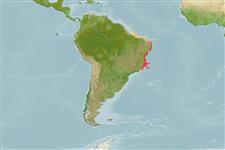>
Ovalentaria/misc (Various families in series Ovalentaria) >
Pomacentridae (Damselfishes) > Chrominae
Etymology: Chromis: Greek, chromis = a fish, perhaps a perch (Ref. 45335); jubauna: From a contraction from the Tupi-Guarani words 'juba' meaning yellow and 'una' meaning black, in reference to its distinctive coloration (Ref. 27310).
Environment: milieu / climate zone / depth range / distribution range
Ecologia
marinhas associadas(os) a recifes; intervalo de profundidade 10 - 70 m (Ref. 27310). Tropical; - 22°S
Southwest Atlantic: Brazil.
Tamanho / Peso / Idade
Maturity: Lm ? range ? - ? cm
Max length : 7.4 cm SL macho/indeterminado; (Ref. 27310)
Descrição breve
Chaves de identificação | Morfologia | Morfometria
Espinhos dorsais (total) : 13; Raios dorsais moles (total) : 11 - 12; Espinhos anais: 2; Raios anais moles: 9 - 11; Vértebras: 23. Color black in life, paler ventrally. Caudal peduncle and fin and upper 3/4 of soft dorsal fin yellow; black anal and pelvic fins (some have very small yellow spots on tips of anal rays); transparent or yellowish pectoral fin, with a dark spot at axil; pectoral spot remains visible in preserved specimens. Oblique mouth; a small, opercle with a flat spine posteriorly, aligned with the pupil, its margin smooth with a round corner; lower edge of suborbitals scaled. Tubed lateral line scales, 15-17; pored scales on mid-posterior part of body and caudal peduncle 10-13; branchiostegal rays 6; predorsal bones 3. (Ref. 27310).
Adults are found in open areas with great water circulation over rocky bottom; usually in groups, 4-5 m above the substrate, seeking shelter on the bottom when there are predators (Ref. 27310). Maximum depth from Ref. 126840. Oviparous, distinct pairing during breeding (Ref. 205). Eggs are demersal and adhere to the substrate (Ref. 205). Males guard and aerate the eggs (Ref. 205).
Life cycle and mating behavior
Maturities | Reprodução | Spawnings | Egg(s) | Fecundities | Larvas
Oviparous, distinct pairing during breeding (Ref. 205). Eggs are demersal and adhere to the substrate (Ref. 205). Males guard and aerate the eggs (Ref. 205).
Leão de Moura, R., 1995. A new species of Chromis (Perciformes: Pomacentridae) from the southeastern coast of Brazil, with comments on other species of the genus. Rev. Fr. Aquariol. 21(3-4):91-96. (Ref. 27310)
Categoria na Lista Vermelha da IUCN (Ref. 130435)
Ameaça para o homem
Harmless
Utilização humana
Ferramentas
Relatórios especiais
Descarregue XML
Fontes da internet
Estimates based on models
Preferred temperature (Ref.
123201): 25 - 27.6, mean 27.3 °C (based on 130 cells).
Phylogenetic diversity index (Ref.
82804): PD
50 = 0.5000 [Uniqueness, from 0.5 = low to 2.0 = high].
Bayesian length-weight: a=0.01778 (0.00796 - 0.03971), b=2.99 (2.81 - 3.17), in cm total length, based on LWR estimates for this Genus-body shape (Ref.
93245).
Nível Trófico (Ref.
69278): 3.0 ±0.1 se; based on size and trophs of closest relatives
Resiliência (Ref.
120179): Elevada, tempo mínimo de duplicação da população menor que 15 meses (Preliminary K or Fecundity.).
Fishing Vulnerability (Ref.
59153): Low vulnerability (10 of 100).
